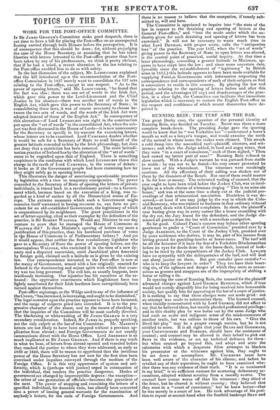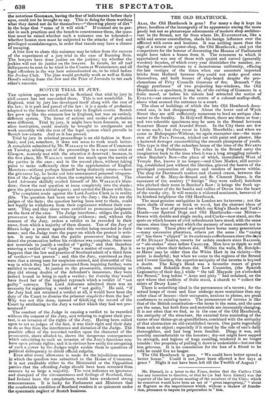RUNNING REIN: THE TURF AND THE BAR. THE great Derby
case, the question of the personal identity of Running Rein, was decided on Tuesday. Never was there a more complete break-down. The presiding Judge gave the sporting world to know that lie " was Yorkshire too "—understood a horse mouth as well as a lawyer's tongue, and would examine the teeth of the animal in whose name the stakes were claimed. This struck a cold damp into the assembled turf—plaintiff, abettors, and wit- nesses; and when the Judge added, in loud and angry tones, that they were " in a court of conscience," each of them sighed, "Thou Nast cowed my better part of man!" Running Rein refused to show mouth. With a Judge's warrant he was pursued from stable to stable : he was not to be found—his very owner protested be knew not of his whereabout. The witnesses were sneakingly cautious. All the effrontery of their calling was shaken out of them by the thunders of the Bench. Not one of them could muster a lie for love or money. The reiterated wailing of counsel, that the case ought to have been tried before the Jockey Club, was as intel- ligible as a whole chorus of witnesses singing " This is no mine ain house," and was at the same time a sharp cut at the judicial pro- ceedings of that aristocratical association. Doubtless it was de- served,—at least if one may judge by the way in which the Colo- nial Secretary, who was trained to business in that ordinary tribunal of the turf, deals with Colonial complaints. In short, the plaintiff's case having given way in every corner like a house crumbling with the dry rot, the Jury found for the defendant, and the Judge dis- missed all parties from the bar with a merciless castigation.
So far good. Colonel PEEL'S success may induce other sporting gentlemen to prefer a "Court of Conscience," presided over by a Judge ALDERSON, to the Court of the Jockey Club, presided over
by some nobleman who derives, it may be, part of his income from letting ground for gambling-booths at horse-races. The turf will be all the honester if it have the fear of a Yorkshire Rhadamanthus before its eyes for deeds done in the horse-flesh, instead of look- ing to be tried by the sympathizers of the Jockey Club. Lawyers have no sympathy with the delinquencies of the turf, and will deal out sharp justice on them. But pis custodiet ipsos custodes?— who is to keep the lawyers in order ? They too have their beset-
ting sin, of the ugliness and danger of which they seem as uncon- scious as grooms and strappers are of the impropriety of shifting a horse or telling a lie. In opening the case of Running Rein, the counsel for the plaintiff advanced charges against Lord GEORGE BENTINCK, which if true
would not merely disqualify him for being received into honourable society, but qualify him for appearing at the bar of a court of justice. It is nothing to say that those charges were not made good : not an attempt was made to substantiate them. The learned counsel,
when timidly-remonstrated with by Lord GEORGE, did not affect to say that he believed them, but merely pleaded professional privilege : and in this shabby plea he was borne out by the same Judge who
had such an acute and indignant sense of the misdemeanours of another trade, but was callous to those of his own. " Give the
Devil fair play " may be a proper enough maxim, but he is not entitled to more. It is all right that your BEANS and GOODMANS, your COURVO1SIERS and BARBERS, should have the assistance of counsel ; and counsel may be allowed in their behalf to pick out flaws in the evidence, or set up technical defences for them : but when counsel go beyond this, and adopt and utter the calumnies with which a desperate felon attempts to blacken his prosecutor or the witnesses against him, they ought to be set down as accomplices. Mr. CocEnuEst must have been well aware of the character of his clients; and before he retailed any of their aspersions, he ought to have examined whe- ther there was any evidence of their truth. "It is so nominated in my brief," is no sufficient warrant for scattering defamatory ac- cusations, adopted without scrutiny from a rascally source. The counsel here comes worse off than his witnesses : they shied at the fence, but he cleared it without craning ; they believed that they were in a " court of conscience," but he knew better—that he was merely in a court of law. He took advantage of his posi- tion to repeat at second-hand what the fourfold bankrupt BEAN and the notorious GOODMAN, having the fear of indictments before their eyes, could not be brought to say. This is doing, for these worthies what they dared not do for themselves—" throwing plenty of dirt" in the hope that "some of it will stick." If counsel are to per- sist in such practices and the bench to countenance them, the ques- tion must be raised whether such a nuisance can be tolerated— whether honest men must be subjected to the attacks of feed and privileged scandalmongers, in order that rascals may have a chance of escaping.
A hint how to abate this nuisance may be taken from the success of the experiment of a jury trial in the case of Running Rein. The lawyers have done justice on the jockies ; try whether the jockies will not do justice on the lawyers. In future, let all turf delinquents be sent to be tried in the Courts at Westminster, and all legal offenders in the way here animadverted on, to be tried before the Jockey Club. The plan would probably work as well as Robin Hood's setting Isaac the Jew and the Prior of Jorvaulx to tax each other's ransoms.



























 Previous page
Previous page